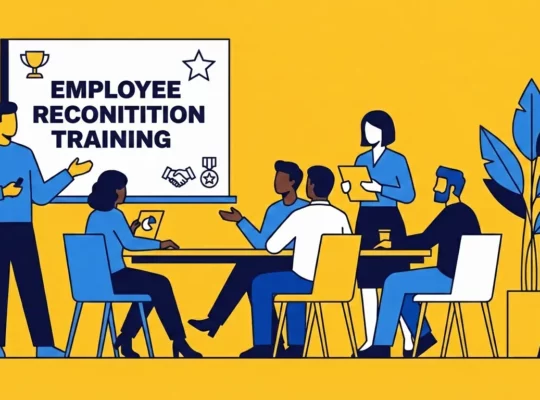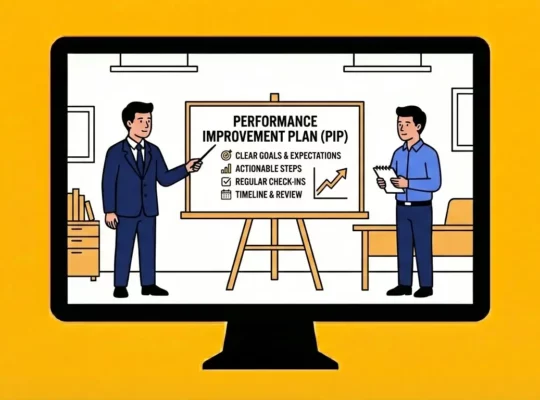The employer has the power of direction over the employee, which gives them various rights such as the annual evaluation of an employee. Usually taking place at the end of the year, this process offers many advantages for the company.
What is the annual employee evaluation? What is the purpose of this process? How does an evaluation interview work and what are its advantages? Here’s everything you need to know about an employee’s annual appraisal interview.
Annual evaluation of an employee: what is it?
The annual employee evaluation is a Human Resources Management (HRM) tool that monitors the professional development of a company’s employees.
Involving employees, HR departments, and management teams, this planned meeting aims to take stock of the professional development of staff during a predefined period.
Depending on the size of the organization, this annual process is conducted either by the direct superior of the evaluated employee, by the company’s Human Resources department, or by the manager.
The annual evaluation of an employee is the moment during which the employee exchanges with their employer on their role in the company and the various missions carried out during the previous year.
To better prepare for this annual process, a company can rely on the opinions of its employees. One of the best ways to do this is to use a trusted platform for employee reviews. This platform will help collect information that will be useful to prepare a relevant and objective interview questionnaire.
The content of an employee’s annual evaluation
The topics discussed during an employee’s annual evaluation generally relate to:
- The employee’s overall performance (successes, failures, difficulties encountered, missions performed, results obtained, etc.);
- Professional relations and the sharing of the company’s values and culture;
- Professional development (the objectives, needs, and expectations of the employee);
- Skills development (the employee’s skills and training needs).
The annual evaluation of employees may also cover several themes. Thus, the HR department can organize an interview on the theme of talent management in companies: identifying, retaining, and valuing employees, whose goal would be to detect and highlight their qualities and performance.
What is the purpose of the annual evaluation?
As an instrument at the service of management, the annual evaluation of employees is useful for the HR department in general, but also for the manager in particular. The evaluation process serves several purposes.
Benefits of the assessment for the company
Thanks to the annual evaluation of employees, the company, more precisely the human resources department, has the opportunity to target and offer training that corresponds to each employee.
These trainings improve the performance of employees as well as their productivity. Therefore, the annual evaluation of an employee contributes greatly to the development of the whole.
This process also helps identify and reward talent within the company. This translates into an improvement in employee motivation and, in turn, the social climate as well.
The annual staff evaluation also makes it possible to identify and process mobility requests on the one hand, but it also serves to set up adapted career plans.
Finally, the annual employee interview is an opportunity for the human resources department to detect stress at work and interact with the company’s employees.
Benefits of the assessment for the HR manager
The annual evaluation of an employee is the ideal time for the HR manager to evaluate the performance of each member of their team. It is also a privileged opportunity to listen to the needs and concerns of the employees.
They will thus be able to detect the needs of employees and set up a managerial policy that will make it possible to fill its shortcomings. The annual appraisal interview allows them to measure commitment to work and boost employees.
This is the ideal opportunity for the manager to consolidate employees’ support for the company’s project.
The legal obligations to be respected in terms of an employee’s annual evaluation
An employer has every right to periodically evaluate their employees as part of their role as manager. This one-on-one interview can be monthly, quarterly, semi-annual, or annual, depending on the organization’s goals and the employee’s role.
There are, however, some rules to follow. Of course, if the evaluation of staff is provided for in the contractual provisions, the employee cannot avoid it. However, the company is obliged to inform them in advance. This is specified in Article L 1222-3 of the Labour Code.
The employee must know the type of assessment in question, the date and place of the evaluation, and the conditions under which it will take place. If it is an evaluation with a rating, they must know the criteria.
Staff representatives should also be informed of the implementation of evaluation processes. This includes the Works Council (CE), the Health, Safety, and Working Conditions Committee (CHSCT), and staff delegates.
How does an annual evaluation of an employee work?
Often perceived as a burden for Human Resources managers, the annual staff evaluation requires time, involvement, and good preparation.
Also, this HR practice is sometimes experienced as a source of stress for the employees evaluated. So, for it to be considered as a lever for professional development and performance, it must be carefully implemented by the company.
Prepare for the evaluation interview
Once the employee is informed of an interview, the HR manager must prepare this interview with the utmost care. This makes it possible to control the course of the interview and to avoid any slippage.
To properly prepare for an employee’s annual appraisal interview, the manager must list the employee’s strengths and areas for improvement. It must also review the objectives set at the end of the ytor to take stock and determine whether or not they have been achieved.
In addition, the employer can also use an example of an employee satisfaction questionnaire to help them carry out the interview.
Exchange and conduct the evaluation interview
During the individual interview, the manager or employer can address different points. For example, they can start with the balance sheet of the past year. This allows them to make remarks and conclusions on the work provided by the employee.
They can then evaluate the employee’s skills, in other words, their soft skills and hard skills. Finally, the manager can define the new objectives for the coming year.
The manager must also let the employee take stock of their feelings about the past year and communicate their expectations for the coming year. Only at the end of this exchange can a manager conclude an employee’s annual appraisal interview.





